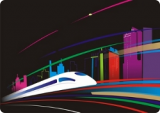
Transport Overview No. 53
A unique overview by the Centre d’analyse stratégique written by Christine Raynard, Department of Sustainable Development.
1) For the first time in Europe, an airline and a bus company have set up a plane and bus ticket combination package. Iberia and the bus company Alsa joined forces to enable passengers on international flights to continue their trip on intercity buses.
Initially, this service will start being offered in a few weeks for services to Burgos, Soria, Valladolid, Albacete, and Lorca, provincial towns not served internationally by Iberia. The travel time by bus from the airport of Madrid-Barajas is between 2 hours and 5,5 hours.
The departures are scheduled so that travelers have time to pick up their luggage and pass through security without missing their connection.
Ultimately, this offer will be extended to other Spanish cities and even other countries.
Tickets are available on the various sale sites of both companies, as well as their agencies and their websites.
2) The Israeli Prime Minister recently presented a proposed railway line connecting Tel Aviv to Eilat in the south, 350 miles across the Negev desert. Eventually, it will be connected to the ports of Ashdod and Haifa.
Passenger trains will run at a maximum speed of 170 km/h and the line, which will also be designed to handle freight transportation, will be a new gateway between Europe and Asia, currently exclusively possible through the Suez Canal. Ships will be able to unload their cargo at the port of Eilat where it can then be transported by rail.
However, the line will need to guarantee security since the region is relatively unstable.
The project could emerge towards 2017/2018 with an estimated cost of $8,6 billion shekels (1,76 billion euros). Three funding options were considered: direct funding, a public-private partnership or the use of Chinese companies. The third option seems to be the government's preference.
3) The Deutsche Bahn (DB) has created a new bonus scheme for their executive committee members. These bonuses, representing about two thirds of their pay, now depend on two factors, 50% of the bonus is based on employee and customer satisfaction, and 50% on the group's results and its success in reaching the development goals. This scheme will motivate executives to ensure better service.
The calculation of the bonus will be made based on the results of regularly conducted polls that measure the perceptions of passengers. The first surveys of 300,000 employees at the DB are expected to be provided this spring.
This method of matching executive bonuses to customer satisfaction has already existed in Germany for several years in large companies such as Lufthansa and the software producer SAP.
4) The prototype of a small foldable electrical car called Hiriko (meaning "city" in Basque) has just been presented to the European Commission by a consortium of seven small businesses in the Spanish Basque country. Each company is responsible for the production of a module and the innovative idea is to create assembly plants in the cities where the small vehicle is used. Several cities have already shown interest: Barcelona, Berlin, Hong Kong, Malmo (Sweden), Quito and the Galapagos Islands, San Francisco, Vitoria-Gasteiz (second largest city in the Spanish Basque country). Discussions are also underway with Abu Dhabi, Amsterdam, Boston, Brussels, Dubai, Geneva, London and Paris.
This car is designed for two people and can fold into itself, reducing its length by 40% (from 2,50 m to 1,50 m), which facilitates parking.
It has four engines integrated directly into the wheels and several lithium-ion batteries are installed under the car. It can cover distances up to 120 km in cities and has a top speed of 60 km/h. However, it is electronically restrained according to the limitations of the urban city centers. According to the manufacturer, the batteries recharge in just 12 minutes. Hiriko is mainly for car-sharing services, but may also be purchased by individuals. It’s scheduled to be introduced on the market in 2013 at a price of 12,500 euros. The battery will be leased to accommodate the rapid evolution of this technology.
5) The American designer Peter Treadway presented the spnKiX, a type of roller motor attached to shoes, at the international electronics fair in Las Vegas in January 2012.
SpnKiX consists of two fairly massive boots made to look like a smaller version of ski boots with oversized wheels attached. Composed primarily of plastic and aluminum, the spnKiX can reach a top speed of 16 km/h, is powered by rechargeable lithium batteries, can travel about four kilometers (two hours to fully recharge) and is controlled with a wireless remote.
It could start selling on the market sometime in 2012 at 649 dollars (495 euros).
Press Contact:
Jean-Michel Roullé, Head of Communications
Tél. +33 (0) 1 42 75 61 37 - jean-michel.roulle@strategie.gouv.fr

